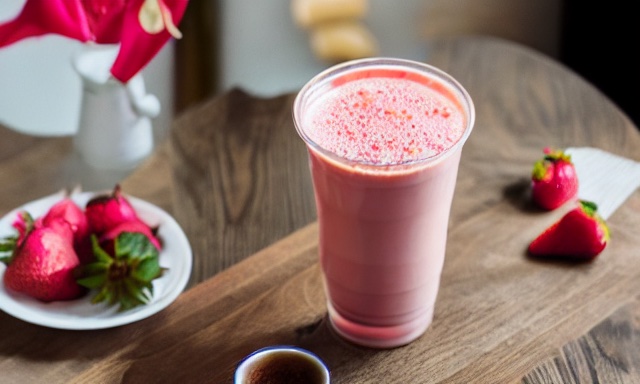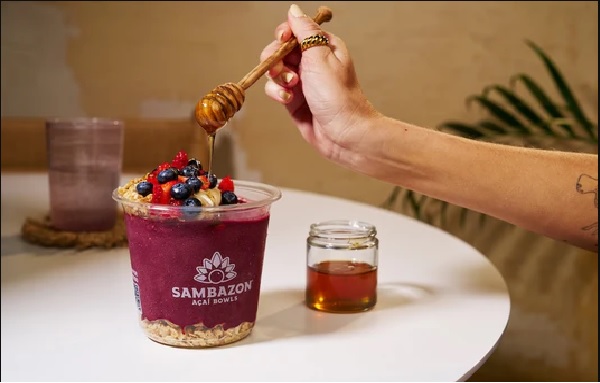Acai berries naturally do not contain caffeine. These nutrient-rich berries are caffeine-free, offering a wholesome option for health-conscious individuals.
Acai, a superfruit hailing from the Amazon region, is celebrated for its antioxidant properties and various health benefits. Esteemed for its rich purple hue and delectable taste, acai is a staple in healthy diets and has gained immense popularity worldwide, notably in smoothie bowls and juices.
It’s packed with vitamins, minerals, and fiber, making it a nutritious addition to any meal. What truly distinguishes acai from other energy-inducing fruits is its lack of stimulants like caffeine, ensuring you can enjoy it any time without impacting your sleep or causing jitters. Embrace the vitality of acai as part of a balanced diet and savor the fusion of flavor and wellness it brings to your table.
Acai Berry Basics
The Acai berry is a small, dark purple fruit. It grows on the acai palm tree. Native to rainforests of Central and South America. The fruit is rich in antioxidants, fiber, and heart-healthy fats. It does not contain any caffeine.
Many people love acai berries. They are famous for their health benefits. Acai is often found in smoothies, bowls, and juices. It is known as a superfood. Fitness enthusiasts and health-conscious folks seek it out. It is thought to boost energy and promote overall health.

Caffeine Content In Common Foods
The acai berry is a popular fruit with many health benefits. Caffeine is often linked to energy, but does it exist in fruits? Specifically, many wonder about the caffeine in acai.
Acai itself does not contain caffeine. It is a caffeine-free option for those seeking a nutritious boost without the stimulant. Other fruits usually lack caffeine as well. Caffeine naturally occurs in a few plants, used in making coffee, tea, and chocolate.
| Food | Caffeine Content |
|---|---|
| Coffee (8oz) | 80-100mg |
| Black Tea (8oz) | 14-70mg |
| Dark Chocolate (1oz) | 12-25mg |
Fruits like acai are not natural sources of caffeine. However, some energy drinks or products with acai may have added caffeine.
The Truth About Acai And Caffeine
Acai berries are a superfood with a rich nutritional profile. They have vitamins, minerals, and antioxidants. People often wonder if acai has caffeine. The answer is: acai berries are almost caffeine-free.
A comparison shows that unlike coffee or tea, acai doesn’t boost energy with caffeine. Instead, its natural properties give a mild energy increase. This is good for those sensitive to caffeine.
| Food Item | Caffeine Content |
|---|---|
| Acai Berry | Negligible |
| Coffee (8oz) | 95mg |
| Black Tea (8oz) | 47mg |
Impact Of Caffeine On Health
The impact of caffeine on health is significant and varied. Caffeine, a stimulant, can lead to both benefits and risks. Among the positives, it may enhance focus, increase alertness, and boost energy levels. Certain individuals, however, may experience downsides. These can include jitters, anxiety, and difficulty sleeping. Each person’s response to caffeine can vary widely because of caffeine sensitivity.
Caffeine consumption should align with individual tolerance. Some people handle caffeine well, with little effect. Others might face adverse reactions even with small amounts. It’s crucial to gauge personal limits and adjust intake accordingly. Listening to one’s body is key in striking the right balance. Doing so promotes health while enjoying the perks of caffeine.
Choosing Acai Products Wisely
When picking acai products, it’s crucial to check the label for ingredients. Many times, companies add caffeine for an energy boost. To ensure you’re getting a pure acai experience, look for no added caffeine on the label. This means reading every ingredient carefully. A product with solely acai berry and natural components is ideal. It’s best to opt for organic options when available. They often have the least additives. Be wary of terms like “energy” or “alertness” as these may hint at added caffeine. Consulting a nutritionist can also help in making informed choices.

Incorporating Acai Into Your Diet
Acai berries are a nutritious food, packed with vitamins and antioxidants. Integrating them into daily meals can boost your dietary health.
- Acai bowls with various fresh fruits and granola make a tasty breakfast.
- For lunch, acai smoothies are quick to prepare and highly refreshing.
- Energy bars with acai can be a perfect snack for sustained energy.
No signs of caffeine exist in acai. Thus, these berries won’t affect your sleep patterns like coffee can.
:max_bytes(150000):strip_icc()/anti-aging-skincare-gifts-is-tout-ab6b131a4e6445d7b9446c995ad1ebcb.jpg)
Frequently Asked Questions Of Does Acai Have Caffeine
Does Acai Have Energy?
Acai berries contain natural sugars and small amounts of caffeine, providing a modest energy boost. Their nutrients and antioxidants may also support increased energy levels.
Who Should Not Take Acai?
People with pollen allergies or sensitivities to acai or similar berries should avoid taking acai. Also, individuals taking certain medications, like blood thinners, may need to consult a doctor before consuming acai.
Is Acai Bowl Good Before Bed?
Acai bowls are not ideal before bed due to their high sugar content, which can disrupt sleep. Opt for a lighter, less sugary snack for better sleep quality.
Is Acai Berry Good For Insomnia?
Acai berries may promote better sleep due to their high content of antioxidants and vitamins, but direct evidence on treating insomnia is limited.
Conclusion
Wrapping up, acai berries are a caffeine-free superfood. They offer a wealth of antioxidants without the buzz of coffee or tea. So, rest easy knowing acai can energize your diet naturally. Embrace this purple power fruit for a healthy, vibrant lifestyle without any caffeine concerns.
Cheers to acai’s pure, energizing goodness!

